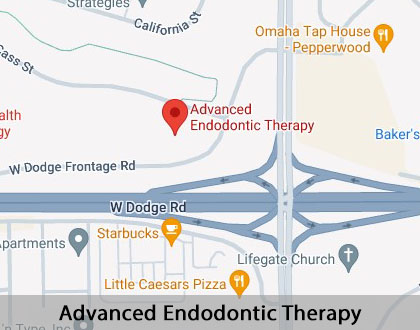Tooth Pain Treatment Omaha, NE
Whether tooth pain is minor or temporary, tooth pain treatment can relieve pain and symptoms while also preventing further damage to the teeth and the patient's oral health. A dental professional can examine and treat serious tooth pain by identifying the cause, recommending treatment, and providing any necessary follow-up care.
Tooth pain treatment is available at Advanced Endodontic Therapy in Omaha and the surrounding area. If an individual requires tooth pain treatment, they can make an appointment directly with an endodontist. Call us at (402) 506-7111 to learn more or to schedule an appointment.
Common Causes of Tooth Pain
A toothache occurs when the nerve inside the tooth is irritated. Tooth pain can arise from a variety of causes, including infection, decay, or tooth injury. Some causes of tooth pain require immediate dental treatment, while others may respond to home treatments. For example, sensitivity to hot or cold foods may be the result of minor tooth decay and may improve with the use of specialized toothpaste for sensitive teeth.
Sharp pain when chewing or biting down may indicate a more serious problem, such as a crack in the tooth or damage to the pulp inside the tooth. Lingering pain that lasts for 30 seconds or more after eating hot or cold foods could also indicate irreversible damage to the tooth pulp. Constant and severe pain and swelling of the gums could be a sign of a tooth abscess, a pocket of pus caused by an infection.
“Tooth pain can arise from many different causes, including infection, decay, or tooth injury.”
When to See an Endodontist for Tooth Pain
If someone has a cracked tooth or a tooth with damaged pulp, they should see a dentist specializing in endodontics. Endodontists are dentists who treat conditions involving tooth pulp. An endodontist can often save a cracked or damaged tooth. If a patient has injured a tooth, noticed swelling around a tooth, or has constant and severe tooth pain, make an appointment with an endodontist immediately. Symptoms such as a throbbing toothache that radiates to the jawbone, bad breath, and a fever may also be a sign of a tooth abscess.
“If a patient has injured a tooth, noticed swelling around a tooth, or has constant and severe tooth pain, make an appointment with an endodontist.”
While Waiting for the Appointment
If the patient damages a tooth, then they should see an endodontist as soon as possible. However, if a patient cannot get an appointment right away, there are steps to manage their tooth pain at home until the appointment. Rinse the mouth with warm salt water to disinfect and help reduce inflammation. Rinsing with hydrogen peroxide is another option. Applying a cold compress or ice wrapped in a towel may help relieve tooth pain and swelling.
“Applying a cold compress or ice wrapped in a towel may help relieve tooth pain and swelling.”
Check out what others are saying about our dental services on Yelp: Tooth Pain Treatment in Omaha, NE
Why Treatment Should Not Be Delayed
People are advised not to put off seeing a dentist or an endodontist if they have a tooth infection. Tooth infections will not go away on their own. Eventually, an infection may cause the pulp inside of a tooth to die, which will cause loss of nerve function. When this happens, the pain will stop, but the bacteria will continue to spread into the surrounding tissue and bone. This can cause the loss of other teeth or even part of the jawbone.
“Tooth infections will not go away on their own.”
Questions Answered on This Page
Q. What is the main cause of a toothache?
Q. What are the symptoms of a tooth infection?
Q. How can someone treat a toothache at home?
Q. Will a tooth infection go away on its own?
Q. How is a tooth infection diagnosed?
People Also Ask
Q. What are the symptoms of an abscessed tooth?
Q. How is a cracked tooth diagnosed?
Q. How are endodontists different than dentists?
Q. What types of tooth damage does an endodontist treat?
What to Expect at the Appointment
At the appointment, the endodontist will examine the affected tooth and the surrounding tissue for signs of infection. They may also take X-rays, which can help determine if an infection has spread. If they think the infection has spread to other areas within the neck, they may also recommend a CT scan. They may also conduct additional tests, such as thermal tests, to assess the health of the tooth pulp. To prepare for an appointment, make a list of the symptoms you are having, even those that may not seem related to tooth pain.
“At the appointment, the endodontist will examine the affected tooth and the surrounding tissue for signs of infection.”
Tooth pain treatment FAQs
Q. What are the risk factors for a tooth infection?
A. Some people are more likely to develop tooth infections. Individuals who smoke are roughly twice as likely as nonsmokers to develop a tooth infection. Bacteria can also thrive in a dry mouth; drinking plenty of water can help reduce bacteria and protect the tooth enamel. Poor dental hygiene will also increase the risk of infection. Brush teeth at least twice a day and see a dentist regularly.
Q. How is an abscessed tooth treated?
A. A tooth abscess is often treated with a root canal. During this procedure, the infected tooth pulp is removed and replaced with a rubber-like material. Depending on the tooth treated, a crown may be placed on the tooth to protect the root canal. With proper care, a restored tooth can last a lifetime. If the root canal fails or the tooth cannot be saved, the tooth will need to be removed.
Q. Is a tooth abscess an emergency?
A. A tooth abscess is an emergency. Seek treatment immediately if an individual has any symptoms of a tooth abscess. If left untreated, the infection can spread throughout the body and can even be life-threatening.
Q. Will a tooth abscess go away with antibiotics?
A. Antibiotics alone will not cure a tooth abscess. An abscess is a pocket of pus and dead tissue in the mouth, which often needs to be drained. Bacteria can become trapped in the tooth roots and spread to the jaw or even the brain without proper cleaning. A dentist may prescribe antibiotics after a root canal to help fight off any remaining bacteria, but the cause of the infection must also be addressed.
Q. What happens if a tooth infection spreads?
A. If a tooth infection spreads to the body, people may develop symptoms such as headache, fatigue, fever, sweating, chills, dehydration, rapid heart rate, increased breathing rate, lightheadedness, vomiting, and diarrhea. They should get immediate medical help if they have difficulty breathing, chest pain, mental confusion, or persistent vomiting. A tooth infection that spreads to the body can also cause sepsis, which can cause tissue damage, organ failure, and even death.
Start Feeling Better – Visit Us Today
By visiting us as soon as possible, our team can help get you the professional treatment you need. Instead of waiting around and allowing the symptoms to get worse, we can provide you with treatment options.
Definitions
Learn More About Tooth Pain Treatment
With prompt treatment, a broken or infected tooth can often be saved. Saving the original tooth is usually preferable to having the tooth removed, as it will help preserve the integrity of the jawbone, protect adjacent teeth, and make chewing easier. Do not hesitate to make an appointment with an endodontist if you have any signs of infection, even if the tooth pain is tolerable.
Call us at 402-506-7111 to learn more or to schedule an appointment.
Helpful Related Links
- Centers for Disease Control and Prevention. Oral Health Tips for Adults. 2024
- Healthline. Symptoms of Tooth Infection. 2024
- Mayo Clinic. Toothache: First aid. 2024
- News Medcial Life Sciences. Dental Abscess Causes and Prevention. 2024
- Radiology Info for Patients. Dental Cone Beam CT. 2024
- ScienceDirect. Dental Pulp. 2024
- WebMd. An Overview of Toothaches. 2024
About our business and website security
- Advanced Endodontic Therapy was established in 2008.
- We accept the following payment methods: Cash, Discover, MasterCard, and Visa
- We serve patients from the following counties: Douglas County, Dodge County, Lancaster County, and Sarpy County
- We serve patients from the following cities: Omaha, Benson, Florence, Bellevue, Fort Calhoun, Papillion, Lincoln, Bennington, Plattsmouth, Fremont and Elkhorn, Missouri Valley, and Council Bluffs
- Norton Safe Web. View Details
- Trend Micro Site Safety Center. View Details
Back to top of Tooth Pain Treatment










